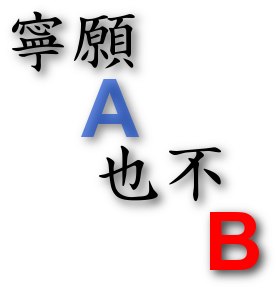宁愿 in Mandarin: rather than, prefer to
 Here’s a couple of handy sentence structures for Mandarin Chinese:
Here’s a couple of handy sentence structures for Mandarin Chinese:
- 宁愿 … 也不 …
- 宁愿 … 也要 …
The two are related but their meanings are opposite in some ways. This is an explanation of the grammar and usage of 宁愿.
宁愿 [A] 也不 [B]
‘rather A than B’
This structure is really useful and pretty straightforward. It’s used to express that someone would rather do action A than action B.
However, it’s not exactly the same as ‘would rather A than B’ in English. Whilst it can be used to express a general preference, quite often it has the connotation that neither choice is particularly desirable, it’s just that A isn’t as bad as B.
The general structure is:
[someone] 宁愿 [verb phrase A] 也不 [verb phrase B]
It’s not essential to express the alternative option, in which case the structure is simpler:
[someone] 宁愿 [verb phrase A]
Examples:
我宁愿不说出来。 Wǒ nìngyuàn bù shuō chūlái. “I’d rather not say.”
他宁愿星期五去。 Tā nìngyuàn xīngqīwǔ qù. “He’d prefer to go on Friday.”
你宁愿说谎也不要让他生气吗? Nǐ nìngyuàn shuōhuǎng yě bùyào ràng tā shēngqì ma? “Would you rather lie than make him angry?”
我宁愿死也不要给你结婚! Wǒ nìngyuàn sǐ yě bùyào gěi nǐ jiéhūn! “I’d rather die than marry you!"**
宁愿 [A] 也要 [B]
rather [A] and [B]
This structure is related but doesn’t contrast the two options. Instead, it’s used to explain that someone is willing to do something in order to achieve something else, or forego A but have B. A is undesirable, but B is worth it.
The general structure is:
[someone] 宁愿 [verb phrase A] 也要 [verb phrase B]
Examples:
我宁愿不睡觉也要看完这本书。 Wǒ nìngyuàn bù shuìjiào yě yào kànwán zhè běn shū. “I’d rather not sleep and finish reading this book.”
我宁愿没有钱也要找到爱情。 Wǒ nìngyuàn méiyǒu qián yě yào zhǎodào àiqíng. “I’d rather have no money but find love.”
我宁愿逃学也要玩电子游戏。 Wǒ nìngyuàn táo xué yě yào wán diànzǐ yóuxì. “I’d rather skip school and play video games.”
